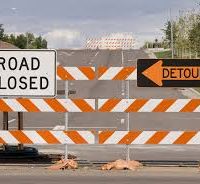This past week, I was involved in a car accident. As I was driving home on Highway 24 from San Francisco, traffic was stopped in the lane where I was traveling, so of course I stopped as well. So I was just standing there, waiting for traffic to move again, when all of a sudden – bam! – someone slammed into me with full force.
The frustrating part: the person who hit me just took off. Highway Patrol is on the case, and I hope they find that person. I was whiplashed and suffered a few bruises, but walked away from the accident. My car? Totaled. All in all, a very frustrating affair.
Now I’ve been living and driving in this country for more than 22 years. In all those years, I’ve only been involved in an accident twice – the other time, about 4 years ago I was rear-ended as well.
Overall, driving is fairly safe. Millions of cars travel in the Bay Area every day – about half a million cars enter San Francisco every day alone. And, yes, there are accidents, but considering how many cars are on the road, the accident rate is pretty low. There’s a reason for that. Do you know?
Rules and laws. Imagine there were no rules and laws for traffic. It would be mayhem, if everyone just did whatever they want to do. But, no, before you can drive here, you need a license, and in order to get the license, you have to pass a test and prove that you know the rules. And knowing the rules is important so that people don’t get hurt. Makes an awful lot of sense, doesn’t it?
Rules and laws give us guidelines to live by, so that we as a society can live together – and not only live, but also prosper together. And that we, as a whole, are protected. As members of a democratic society, we should always be on alert that laws are not broken or twisted by those with money and/or power, but that the law protects everyone.
Are laws and rules sometimes annoying? Of course! Why should I stick to the speed limit, when the road is wide open? Why can’t I drive faster? But then, the welfare of others ranks higher than my personal desires.
Today’s lessons from the Bible are all about rules. In the lesson from the Old Testament, the people of Israel is about to enter the Promised Land after being liberated from slavery in Egypt and meandering in the wilderness for 40 long years. They don’t know how to live together as a settled people, how could they? And so God gives them not only the Ten Commandments, which are the pillars of Jewish Law – no, God gives them 613 laws in the Torah, regulating basically every aspect of life together, from domestic issues over economic issues to religious affairs. These laws are intended to make sure that life as a society – and a society that worships the one God – works.
And so Moses can say in today’s lesson from Deuteronomy, ‘See, I have set before you today life and prosperity, death and adversity. If you obey the commandments of the LORD your God that I am commanding you today, by loving the LORD your God, walking in his ways, and observing his commandments, decrees, and ordinances, then you shall live and become numerous, and the LORD your God will bless you in the land that you are entering to possess.’ Follow the rules, and you, y’all, together, will live, and you will be blessed. Today’s psalm also picks up on that: ‘Happy are those who follow the teaching of God.’ These teachings and rules are given for a reason, and so we better make an effort to follow them, for the sake of life, for the sake of life together.
In today’s gospel, Jesus acknowledges the importance of laws for life together. Today’s gospel is part of the ‘Sermon on the Mount’, the first public speech Jesus delivers as he begins his ministry. I already mentioned last week that this speech is like a program, a ‘State of the Union’, or better, ‘State of the Kingdom of Heaven’. Even in the kingdom of heaven, there need to be rules for life together as children of God.
And Jesus even takes it up a notch from the laws as they are written in the Torah: don’t just refrain from committing murder, but reconcile with those you are angry with. Don’t just refrain from cheating on your spouse, but don’t lust after another person. Don’t divorce your wife because you’re tired of her, but try to work it out and protect her. Don’t just refrain from swearing on the name of God, but refrain from swearing and mincing and twisting your words at all. Be honest and straightforward in all you say and consequently do. That’s quite challenging, isn’t it? To go that extra step and try harder for the sake of love and the sake of God?
What Jesus basically says is that following the law shouldn’t just be a chore or maybe even a nuisance, something we do because we have to, but that we put our hearts in the center of all we say and do. That we interpret the rules in the light of love and care for our neighbor. And that literally requires a change of heart – repentance, as the Bible says. Now we all have heard this word before, haven’t we?
I want to go back to traffic rules and laws for a moment: I follow the rules not only because I have to. No, I don’t want anyone to get hurt or even killed. I care for my neighbors who also participate in traffic – even though I may curse them under my breath once in a while. At the heart of me following the rules is love and care.
According to Jesus, we should treat any law of the Torah just like that. Not focus on the law, but on those who are affected by it – our neighbors, fellow human beings, and our fellow creatures, made lovingly by God. Because that’s God’s intent: to love and care for all.
God gives us rules to live by, not to somehow make it hard on us and to control us, but for our own sake. Rules, laws, commandments are given for the sake of the community. Rules, commandments and laws are given to help us get along with each other. To overcome our selfish desires and give them up for the sake of the greater good. Which in the end benefits us again. Because a community that functions well, a community where people look out for each other, a community I look out for my neighbor, there I am taken care of as well. There we find love and acceptance. There we find a glimpse of the kingdom of heaven.
Jesus wants to instill mercy and compassion in his listeners as they – as we – live with each other. And don’t we need that badly in today’s world?
All this is summarized in a great quote: ‘Live for yourself, and you will live in vain; live for others, and you will live again.’ That’s what God’s laws and rules are all about – they enable us to live with each other and for each other and offer us a way to live life to its fullest and to partake in life eternal. And, by the way, this is a quote by Bob Marley, and he used these words in his song ‘Pass it on’.
In all that, it is good and important and right and salutary to remember that God’s words of judgment and challenge, and especially Christ’s words as we heard them as part of the Sermon on the Mount today, are embedded in the promise of love and life. That laws and commandments come within God’s affirmation: I care deeply about you – and about all. That’s why God gives us commandments, after all, as sign of God’s caring love for everything and everybody created. And because we are loved, we can feel safe and courageous – courageous enough to live up to the potential God sees in all of us. Courageous enough to live God’s dream of a community where no one hurts someone else or gets hurt – a community where people are not curved into themselves, but reach out to the neighbor – a community that reflects the eternal heavenly kingdom of life for all creation.
This is God’s promise. This becomes our call.
Picture by Luis Feirrera on unsplash.com
This post is also available in: German







